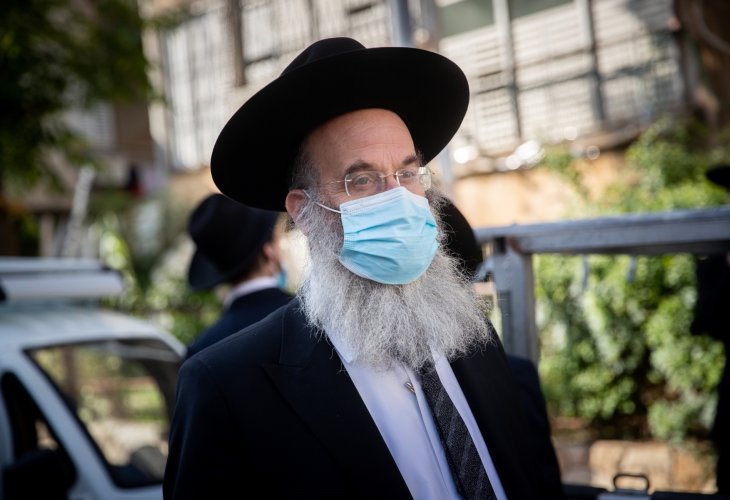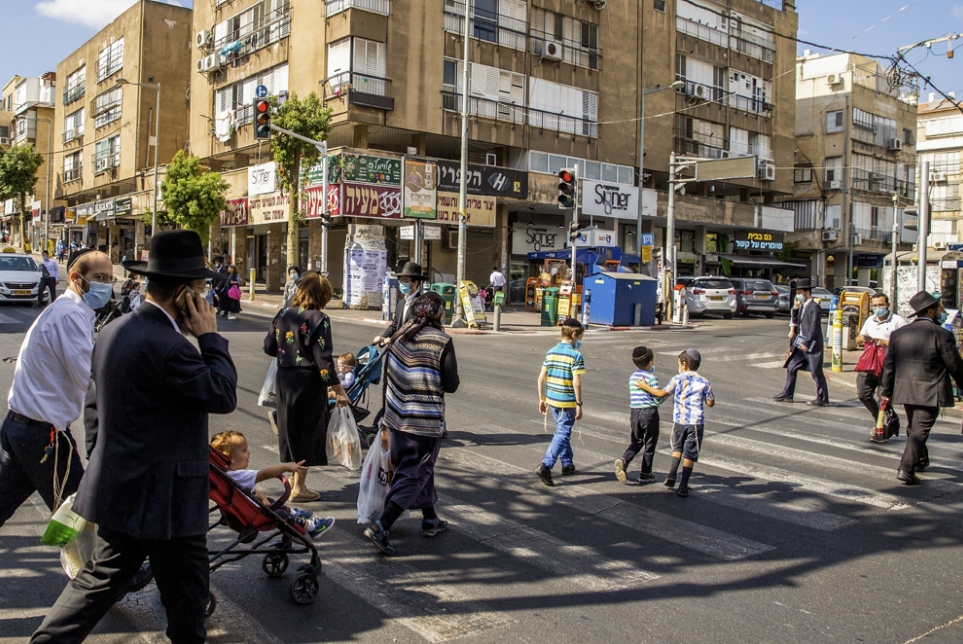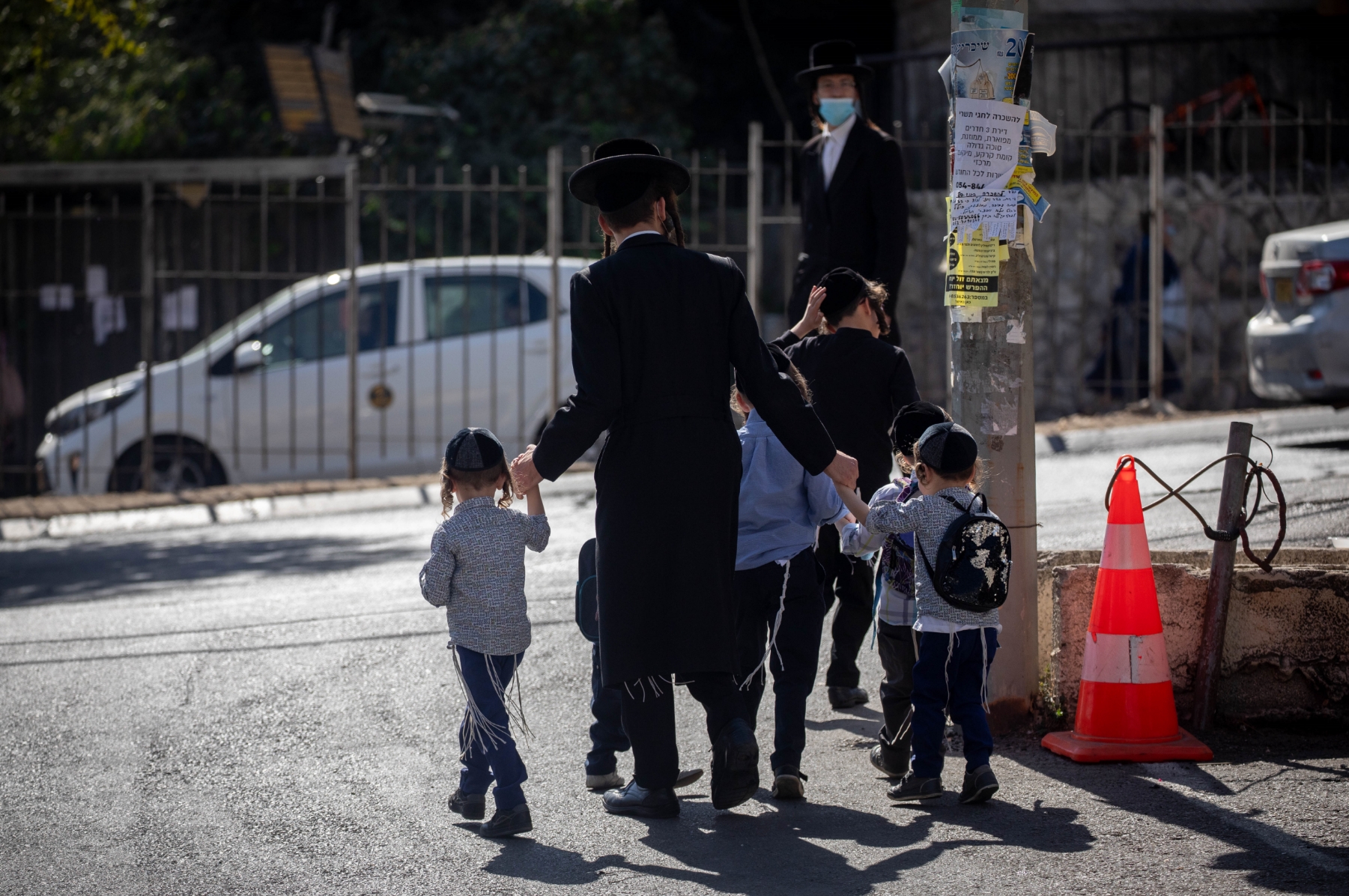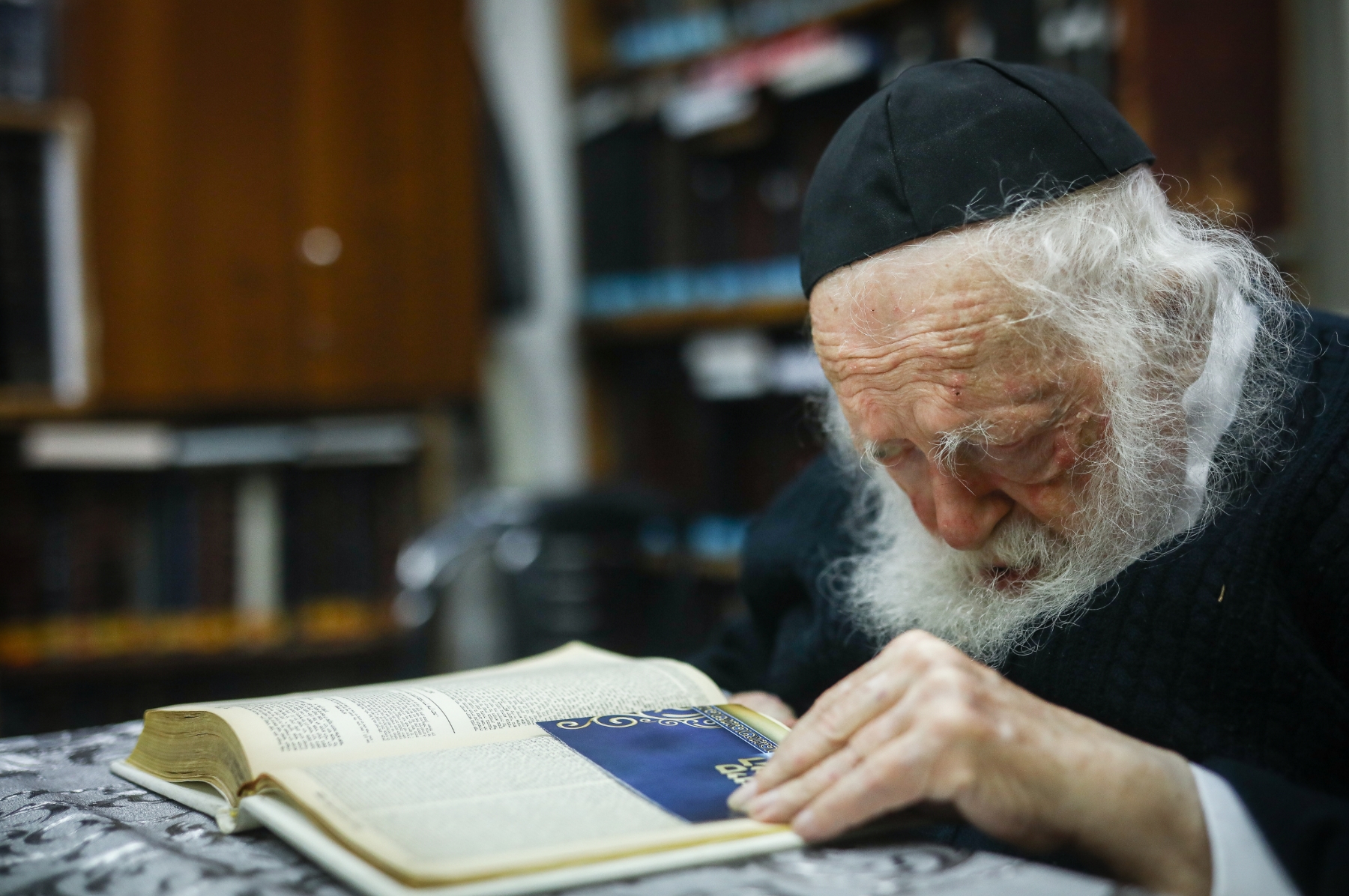Searching for Us in Red: The Controversial Interview with Bnei Brak Mayor
Amid recent city riots, hostile media coverage, reopening of educational institutions, and unique initiatives found only in the city of Torah and Chassidus during COVID-19 times. Rabbi Avraham Rubinstein, Mayor of Bnei Brak, speaks out on it all.
 Rabbi Avraham Rubinstein (Photo: Yonatan Sindel / Flash 90)
Rabbi Avraham Rubinstein (Photo: Yonatan Sindel / Flash 90)"After the first wave of COVID-19, we managed to reduce the infection rate, and the strict adherence of the city's residents to the guidelines created a major sanctification of Hashem," says Rabbi Avraham Rubinstein, Mayor of Bnei Brak. "But now, in the third wave, the feeling is that someone isn't pleased with the goodness and unity that has been created here. Ever since Bnei Brak turned red again, every media outlet is chasing after me. There's an agenda to spoil and disturb our relations, and it seems that someone benefits from brotherly hate."
Upon taking office as the mayor of Bnei Brak, Rubinstein faced many challenges. However, dealing with the coronavirus challenge, and the negative image of the city that followed, was something he could not foresee. "Ultimately, it trickles down, and I am very worried about the harm that this hatred will create toward the Torah and mitzvot-observant public. It started with a taxi driver who refused to pick up a Haredi passenger, and who knows where this situation will evolve."
Speaking Bnei Brak's Language
When the coronavirus arrived in Israel via a Japanese cruise ship and a bus with Korean pilgrims, Bnei Brak was still celebrating the Purim holiday. No one thought for a moment that the mysterious virus from China would also spread here. But soon the grim reality was revealed, and the first wave hit the city hard. "We didn't know how to handle it because no one else did yet," says Rubinstein. "At that time, only the Ministry of Health was in contact with the infected, and we had no way to reach them. We wanted to help contain the virus, but the central government still didn't understand that this matter was greater than it could handle and that it needed to involve the local government in dealing with it. There was a lot of confusion, until we started learning how to handle the pandemic."
 (Photo: Yossi Aloni / Flash 90)
(Photo: Yossi Aloni / Flash 90)Rubinstein heard about Roni Numa, a respected army officer, through an acquaintance. "He came here with ten serious military personnel and set up a command center in an awe-inspiring manner. Most of the Haredi public is not internet-connected, and some don’t even have radios at home, so there was no adapted information for them. Therefore, we worked together to find tailored methods to inform residents about the dangers of the virus. Additionally, there were no quarantine hotels suitable for those observing the mitzvot, which required high-level kosher compliance and modesty. Together, we raised the demand for suitable quarantine hotels, to which we sent many of the city’s infected residents. During that first wave, soldiers came to Bnei Brak and distributed food to the sick to prevent situations where they'd have to leave their homes. We worked in full cooperation with the army and Home Front Command, and together with massive public information and calls from Israel’s prominent rabbis to follow guidelines, the infection rate in the city significantly dropped."
Since then, the second and third waves have already arrived, the city changed color again, yet Rubinstein insists on seeing the glass half full. "For a long time, we managed to remain green, which is commendable in a city that's one of the densest in the world," he says. "It must be understood that in Tel Aviv, a standard apartment might house a family with three children, but in the same size home in Bnei Brak, at least ten family members live. This situation almost guarantees transmission among them, increasing the number of virus positives in the city. Therefore, the fact that Bnei Brak became a green zone shows how much effort was invested and how much the city’s residents tried to follow the guidelines."
How is the city handling the third wave today?
"Initially, we send a gift package to every home with a COVID-19 patient. It's important for us to maintain positive contact with the patients, to ensure the trust in the assistance we offer, and to make sure they don't lose morale. We are also in daily phone contact with the COVID-19 positive individuals to ensure they follow the guidelines and see in which other areas they need help. Another initiative we created in the city is appointing building heads who act as coronavirus coordinators. There are approximately 4,300 buildings in the city, and we recruited about 3,700 coordinators for this purpose. These individuals know exactly what's happening in their building, who contracted COVID-19, what they need, and, of course, encourage the tenants to follow the guidelines. Coordinators also have a direct line to the 106 hotline, where they get immediate responses without waiting on the line. This is one of the unique solutions tailored to Bnei Brak's reality. Generally, it’s not easy to deal with lockdowns and isolation for long periods, especially in a small house with a blessed family, so our psychological service, of course, strives to provide extensive assistance to anyone feeling distressed."
Ron Huldai and I
One of the burning issues, which made headlines after the second lockdown, was the reopening of educational institutions in the city. While across the country students were still at home, Rabbi Chaim Kanievsky called to open the educational institutions, and in Bnei Brak, boys and girls were seen walking to religious schools and schools.
 (Photo: Yonatan Sindel / Flash 90)
(Photo: Yonatan Sindel / Flash 90)Were attempts made to lawfully lead to the opening of the educational institutions?
"The mayor of Tel Aviv, Ron Huldai, and I approached the Ministry of Education with a request to approve studies in capsules. This is an initiative requiring additional teachers, and we had the human resources to offer. We knew we could enlist yeshiva students to work in religious schools voluntarily, and seminaries who would be happy to enter and teach in girls' classes as part of their internship. Tel Aviv, for its part, is a wealthy city that could finance such an initiative, and we both signed a joint letter asking for approval of the program. The Ministry of Education agreed with us that it's the right move, but the proposal wasn’t approved. The reason was a budget dispute between the Treasury and the Education Ministry over who would fund the capsule teachers. We didn’t ask for funding, just for permission to carry it out, and since the decision was made solely due to political conflict, not health needs, educational institutions in Bnei Brak continued forward."
Was there a concern that this could create a clash with law enforcement authorities?
"Let's get to the bottom line of the story - thank G-d, nothing happened. I have been fortunate to be accompanied by Rabbi Chaim Kanievsky for almost 35 years, and it's impossible not to see the siyata d'shmaya concerning his words. In general, amid all the uncertainty, we see how Hashem manages the matters. Our municipal institutions weren't opened by state order, but religious schools and girls' schools, which are independent institutions, operated each according to their discretion. Ultimately, it seems that even at higher levels, it was understood that this was the right move, so no one tried to stop it. Throughout this period, we were a green city, and reopening schools wasn’t what drove the increase in infection."
 (Photo: Shlomi Cohen / Flash 90)
(Photo: Shlomi Cohen / Flash 90)Then how did you become a red city again?
"As soon as the mutations arrived, a high replication number was formed again, not only in Bnei Brak, but throughout the country. This virus is indeed elusive and requires us to learn anew each time. Over time, we launched a massive information campaign concerning the protection of the elderly, and now suddenly children and pregnant women are also getting infected. A pediatrician told me that until now, even children with pre-existing conditions who contracted COVID-19 almost passed without symptoms, but now with the mutation, she sees healthy children contracting the virus severely."
Photographs Better
Just two weeks ago, Bnei Brak made headlines again, this time due to a chain of disturbing riots and hate-filled media coverage. It began with the attack on a licensing inspector's vehicle by a small Chassidic group, quickly escalating into what appeared to be a police show of force in the city, as dozens of officers were seen marching through its streets. Later, many curious residents left their homes and were dispersed by various means, including stun grenades. By midday, youth set trash bins on fire, causing property damage, and even led to the arson of a bus. The heated saga concluded with clear declarations from leading rabbis that such unruly behavior must cease immediately, and with the mayor's announcement that security cameras were installed, making it certain that anyone continuing such acts will be caught and punished to the fullest extent of the law."
How is the municipality dealing with minority groups not adhering to COVID-19 regulations?
"In every community, there are COVID-19 deniers, and now there are also vaccine deniers. The minority always exists, and it's the security forces' role to address such issues. As a municipality, we move forward with massive information campaigns on the virus, and now also tackling vaccinations, to lead as many people as possible to adhere to the guidelines. City residents receive many phone calls about this, and we even use volunteer organizations to transport anyone who finds it difficult to leave their home for vaccinations."
During the recent riots, teenagers who perhaps enjoyed the 'festivity' were noticeable. What response do you provide for them in the city?
"Youth have always been a primary concern for us, and we care for them regardless of COVID-19. At night, street counselors roam the city, bonding with these young people and attending to all their needs. Additionally, we're in advanced stages of establishing a large youth center that will provide a broader response in the field, including a vast learning center in various professional fields, an employment center, and a leisure and activity space. Unfortunately, there're also unruly youth groups uninterested in any connection or willing to accept authority, and those we can't work with for the good, we handle with 'better ways.'"
Nonetheless, there seem to be genuine law violations in the city
"Law violations exist in every city, but maybe it just photographs better here, and it's clear that under rabbinic leadership, we're adamantly opposed to violating guidelines. Nowhere is it written that one must marry with 500 guests, and I keep reminding everyone that when my parents arrived in the country after the Holocaust, they got married in a small restaurant in Tel Aviv with only ten friends around. Therefore, I'd like to call on everyone listening to me, to stop this hatred now and not let those with divisive desires lead forward. Eventually, we'll end with COVID-19, but I fear this fraternal hatred might be hard to heal by then."

